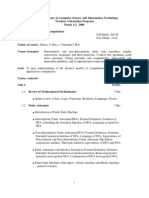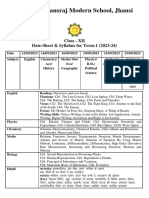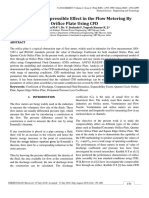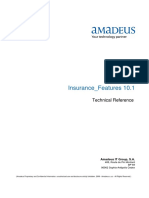Formal Languages Automata Thery PDF
Formal Languages Automata Thery PDF
Uploaded by
Kalyan RamCopyright:
Available Formats
Formal Languages Automata Thery PDF
Formal Languages Automata Thery PDF
Uploaded by
Kalyan RamOriginal Title
Copyright
Available Formats
Share this document
Did you find this document useful?
Is this content inappropriate?
Copyright:
Available Formats
Formal Languages Automata Thery PDF
Formal Languages Automata Thery PDF
Uploaded by
Kalyan RamCopyright:
Available Formats
DIGITAL NOTES
ON
FORMAL LANGUAGES AND AUTOMATA
THEORY
B.TECH II YEAR - II SEM
(2017-18)
DEPARTMENT OF INFORMATION TECHNOLOGY
MALLA REDDY COLLEGE OF ENGINEERING & TECHNOLOGY
(Autonomous Institution – UGC, Govt. of India)
(Affiliated to JNTUH, Hyderabad, Approved by AICTE - Accredited by NBA & NAAC – ‘A’ Grade - ISO 9001:2015 Certified)
Maisammaguda, Dhulapally (Post Via. Hakimpet), Secunderabad – 500100, Telangana State, INDIA.
FORMAL LANGUAGES AND AUTOMATA THEORY Page 1
MALLA REDDY COLLEGE OF ENGINEERING & TECHNOLOGY
DEPARTMENT OF INFORMATION TECHNOLOGY
II Year B.Tech IT – II Sem L T /P/D C
4 -/-/- 3
(R15A0506)FORMAL LANGUAGES AND AUTOMATA THEORY
Objectives:
To teach the student to identify different formal language classes and their
relationships
To teach the student the theoretical foundation for designing compilers.
To teach the student to use the ability of applying logical skills.
Teach the student to prove or disprove theorems in automata theory using its
properties
To teach the student the techniques for information processing.
Understand the theory behind engineering applications.
UNIT I:
Fundamentals: Strings, Alphabet, Language, Operations, Finite state machine, definitions,
finite automaton model, acceptance of strings, and languages, FA, transition diagrams and
Language recognizers.
Finite Automata: Deterministic finite automaton, Non deterministic finite automaton and
NFA with Є transitions - Significance, acceptance of languages. Conversions and
Equivalence : Equivalence between NFA with and without Є transitions, NFA to DFA
conversion, minimization of FSM, equivalence between two FSMs, Finite Automata with
output- Moore and Melay machines.
UNIT II:
Regular Languages: Regular sets, regular expressions, identity rules, Conversion finite
Automata for a given regular expressions, Conversion of Finite Automata to Regular
expressions. Pumping lemma of regular sets, closure properties of regular sets (proofs not
required).
UNIT III:
Grammar Formalism: Regular grammars-right linear and left linear grammars, equivalence
between regular linear grammar and FA, inter conversion, Context free grammar, derivation
trees, sentential forms. Right most and leftmost derivation of strings.
Context Free Grammars: Ambiguity in context free grammars. Minimisation of Context
Free Grammars. Chomsky normal form, Greibach normal form, Pumping Lemma for Context
Free Languages. Enumeration of properties of CFL (proofs omitted).
UNIT IV:
FORMAL LANGUAGES AND AUTOMATA THEORY Page 2
Push Down Automata: Push down automata, definition, model, acceptance of CFL,
Acceptance by final state and acceptance by empty state and its equivalence. Equivalence of
CFL and PDA, interconversion. (Proofs not required). Introduction to DCFL and DPDA.
LINEAR BOUNDED AUTOMATA(LBA):LBA,context sensitive grammars ,CS languages
UNIT V:
Turing Machine: Turing Machine, definition, model, design of TM, Computable functions,
recursively enumerable languages. Church’s hypothesis, counter machine, types of Turing
machines (proofs not required).
Computability Theory: Chomsky hierarchy of languages, linear bounded automata and
context sensitive language, LR(0) grammar, decidability of, problems, Universal Turing
Machine, undecidability of posts. Correspondence problem, Turing reducibility, Definition of
P and NP problems, NP complete and NP hard problems.
TEXT BOOKS:
1. “Introduction to Automata Theory Languages and Computation”. Hopcroft H.E. and
Ullman J. D. Pearson Education.
2. Introduction to Theory of Computation - Sipser 2nd edition Thomson
REFERENCE BOOKS:
1. Introduction to Computer Theory, Daniel I.A. Cohen, John Wiley.
2. Introduction to languages and the Theory of Computation ,John C Martin, TMH
3. “Elements of Theory of Computation”, Lewis H.P. & Papadimition C.H. Pearson /PHI.
4. Theory of Computer Science and Automata languages and computation -Mishra and
Chandrashekaran, 2nd edition, PHI.
5. Theory of Computation, By K.V.N. Sunitha and N.Kalyani
Course Outcomes:
Student will have the ability to
Apply knowledge in designing or enhancing compilers.
Design grammars and automata (recognizers) for different language classes.
Apply knowledge in developing tools for language processing or text processing.
FORMAL LANGUAGES AND AUTOMATA THEORY Page 3
MALLA REDDY COLLEGE OF ENGINEERING & TECHNOLOGY
DEPARTMENT OF INFORMATION TECHNOLOGY
INDEX
S. No Topic Page no
Unit
1 Strings, Alphabet, Language, Operations 6-9
2 Finite state machine, 10-15
3 Finite Automata: DFA,NFA,With Є transitions 16-21
I
4 Conversions and Equivalence : 22-27
NFA to DFA conversion, minimization of FSM, 28-32
5
equivalence between two FSMs
6 Finite Automata with output 46-52
II Regular Languages: Conversion, Pumping lemma of
7 53-58
regular sets
8 Pumping lemma of regular sets 59-64
9 FA:RLG,LLG, Sentential forms 65-72
10 Context Free Grammars:CNF,GNF 73-93
III
Pumping Lemma for Context Free Languages.
11 94-107
Enumeration of properties of CFL
Equivalence of CFL and PDA, inter conversion Push 108-112
12 IV Down Automata, LBA,CSL
Turing Machine: Church’s hypothesis, counter
13 113-115
machine, types of Turing machines
V
LR(0) grammar, decidability of, problems,UTM,P 116-122
14
and NP Problems
FORMAL LANGUAGES AND AUTOMATA THEORY Page 4
MALLA REDDY COLLEGE OF ENGINEERING & TECHNOLOGY
DEPARTMENT OF INFORMATION TECHNOLOGY
UNIT-1
FORMAL LANGUAGES AND AUTOMATA THEORY Page 5
FORMAL LANGUAGES AND AUTOMATA THEORY Page 6
FORMAL LANGUAGES AND AUTOMATA THEORY Page 7
FORMAL LANGUAGES AND AUTOMATA THEORY Page 8
FORMAL LANGUAGES AND AUTOMATA THEORY Page 9
FORMAL LANGUAGES AND AUTOMATA THEORY Page 10
FORMAL LANGUAGES AND AUTOMATA THEORY Page 11
FORMAL LANGUAGES AND AUTOMATA THEORY Page 12
FORMAL LANGUAGES AND AUTOMATA THEORY Page 13
FORMAL LANGUAGES AND AUTOMATA THEORY Page 14
FORMAL LANGUAGES AND AUTOMATA THEORY Page 15
FORMAL LANGUAGES AND AUTOMATA THEORY Page 16
FORMAL LANGUAGES AND AUTOMATA THEORY Page 17
FORMAL LANGUAGES AND AUTOMATA THEORY Page 18
FORMAL LANGUAGES AND AUTOMATA THEORY Page 19
FORMAL LANGUAGES AND AUTOMATA THEORY Page 20
FORMAL LANGUAGES AND AUTOMATA THEORY Page 21
FORMAL LANGUAGES AND AUTOMATA THEORY Page 22
FORMAL LANGUAGES AND AUTOMATA THEORY Page 23
FORMAL LANGUAGES AND AUTOMATA THEORY Page 24
FORMAL LANGUAGES AND AUTOMATA THEORY Page 25
FORMAL LANGUAGES AND AUTOMATA THEORY Page 26
FORMAL LANGUAGES AND AUTOMATA THEORY Page 27
Unit-II
FORMAL LANGUAGES AND AUTOMATA THEORY Page 28
FORMAL LANGUAGES AND AUTOMATA THEORY Page 29
FORMAL LANGUAGES AND AUTOMATA THEORY Page 30
FORMAL LANGUAGES AND AUTOMATA THEORY Page 31
FORMAL LANGUAGES AND AUTOMATA THEORY Page 32
FORMAL LANGUAGES AND AUTOMATA THEORY Page 33
FORMAL LANGUAGES AND AUTOMATA THEORY Page 34
FORMAL LANGUAGES AND AUTOMATA THEORY Page 35
FORMAL LANGUAGES AND AUTOMATA THEORY Page 36
FORMAL LANGUAGES AND AUTOMATA THEORY Page 37
FORMAL LANGUAGES AND AUTOMATA THEORY Page 38
FORMAL LANGUAGES AND AUTOMATA THEORY Page 39
FORMAL LANGUAGES AND AUTOMATA THEORY Page 40
FORMAL LANGUAGES AND AUTOMATA THEORY Page 41
UNIT-3
FORMAL LANGUAGES AND AUTOMATA THEORY Page 42
FORMAL LANGUAGES AND AUTOMATA THEORY Page 43
FORMAL LANGUAGES AND AUTOMATA THEORY Page 44
FORMAL LANGUAGES AND AUTOMATA THEORY Page 45
FORMAL LANGUAGES AND AUTOMATA THEORY Page 46
FORMAL LANGUAGES AND AUTOMATA THEORY Page 47
UNIT-3
FORMAL LANGUAGES AND AUTOMATA THEORY Page 48
FORMAL LANGUAGES AND AUTOMATA THEORY Page 49
FORMAL LANGUAGES AND AUTOMATA THEORY Page 50
FORMAL LANGUAGES AND AUTOMATA THEORY Page 51
FORMAL LANGUAGES AND AUTOMATA THEORY Page 52
FORMAL LANGUAGES AND AUTOMATA THEORY Page 53
FORMAL LANGUAGES AND AUTOMATA THEORY Page 54
FORMAL LANGUAGES AND AUTOMATA THEORY Page 55
FORMAL LANGUAGES AND AUTOMATA THEORY Page 56
FORMAL LANGUAGES AND AUTOMATA THEORY Page 57
FORMAL LANGUAGES AND AUTOMATA THEORY Page 58
FORMAL LANGUAGES AND AUTOMATA THEORY Page 59
FORMAL LANGUAGES AND AUTOMATA THEORY Page 60
FORMAL LANGUAGES AND AUTOMATA THEORY Page 61
FORMAL LANGUAGES AND AUTOMATA THEORY Page 62
UNIT-4
FORMAL LANGUAGES AND AUTOMATA THEORY Page 63
FORMAL LANGUAGES AND AUTOMATA THEORY Page 64
FORMAL LANGUAGES AND AUTOMATA THEORY Page 65
FORMAL LANGUAGES AND AUTOMATA THEORY Page 66
FORMAL LANGUAGES AND AUTOMATA THEORY Page 67
FORMAL LANGUAGES AND AUTOMATA THEORY Page 68
FORMAL LANGUAGES AND AUTOMATA THEORY Page 69
FORMAL LANGUAGES AND AUTOMATA THEORY Page 70
FORMAL LANGUAGES AND AUTOMATA THEORY Page 71
FORMAL LANGUAGES AND AUTOMATA THEORY Page 72
FORMAL LANGUAGES AND AUTOMATA THEORY Page 73
FORMAL LANGUAGES AND AUTOMATA THEORY Page 74
FORMAL LANGUAGES AND AUTOMATA THEORY Page 75
UNIT-5
FORMAL LANGUAGES AND AUTOMATA THEORY Page 76
FORMAL LANGUAGES AND AUTOMATA THEORY Page 77
FORMAL LANGUAGES AND AUTOMATA THEORY Page 78
FORMAL LANGUAGES AND AUTOMATA THEORY Page 79
FORMAL LANGUAGES AND AUTOMATA THEORY Page 80
FORMAL LANGUAGES AND AUTOMATA THEORY Page 81
FORMAL LANGUAGES AND AUTOMATA THEORY Page 82
FORMAL LANGUAGES AND AUTOMATA THEORY Page 83
FORMAL LANGUAGES AND AUTOMATA THEORY Page 84
FORMAL LANGUAGES AND AUTOMATA THEORY Page 85
FORMAL LANGUAGES AND AUTOMATA THEORY Page 86
FORMAL LANGUAGES AND AUTOMATA THEORY Page 87
FORMAL LANGUAGES AND AUTOMATA THEORY Page 88
FORMAL LANGUAGES AND AUTOMATA THEORY Page 89
FORMAL LANGUAGES AND AUTOMATA THEORY Page 90
FORMAL LANGUAGES AND AUTOMATA THEORY Page 91
FORMAL LANGUAGES AND AUTOMATA THEORY Page 92
FORMAL LANGUAGES AND AUTOMATA THEORY Page 93
FORMAL LANGUAGES AND AUTOMATA THEORY Page 94
FORMAL LANGUAGES AND AUTOMATA THEORY Page 95
FORMAL LANGUAGES AND AUTOMATA THEORY Page 96
FORMAL LANGUAGES AND AUTOMATA THEORY Page 97
FORMAL LANGUAGES AND AUTOMATA THEORY Page 98
FORMAL LANGUAGES AND AUTOMATA THEORY Page 99
FORMAL LANGUAGES AND AUTOMATA THEORY Page 100
FORMAL LANGUAGES AND AUTOMATA THEORY Page 101
FORMAL LANGUAGES AND AUTOMATA THEORY Page 102
FORMAL LANGUAGES AND AUTOMATA THEORY Page 103
FORMAL LANGUAGES AND AUTOMATA THEORY Page 104
FORMAL LANGUAGES AND AUTOMATA THEORY Page 105
FORMAL LANGUAGES AND AUTOMATA THEORY Page 106
FORMAL LANGUAGES AND AUTOMATA THEORY Page 107
FORMAL LANGUAGES AND AUTOMATA THEORY Page 108
FORMAL LANGUAGES AND AUTOMATA THEORY Page 109
FORMAL LANGUAGES AND AUTOMATA THEORY Page 110
FORMAL LANGUAGES AND AUTOMATA THEORY Page 111
FORMAL LANGUAGES AND AUTOMATA THEORY Page 112
FORMAL LANGUAGES AND AUTOMATA THEORY Page 113
FORMAL LANGUAGES AND AUTOMATA THEORY Page 114
FORMAL LANGUAGES AND AUTOMATA THEORY Page 115
FORMAL LANGUAGES AND AUTOMATA THEORY Page 116
FORMAL LANGUAGES AND AUTOMATA THEORY Page 117
FORMAL LANGUAGES AND AUTOMATA THEORY Page 118
FORMAL LANGUAGES AND AUTOMATA THEORY Page 119
FORMAL LANGUAGES AND AUTOMATA THEORY Page 120
FORMAL LANGUAGES AND AUTOMATA THEORY Page 121
FORMAL LANGUAGES AND AUTOMATA THEORY Page 122
You might also like
- Theory of Computation and Application- Automata,Formal languages,Computational Complexity (2nd Edition): 2, #1From EverandTheory of Computation and Application- Automata,Formal languages,Computational Complexity (2nd Edition): 2, #1No ratings yet
- Delhi University - BMS Syllabus PDFDocument72 pagesDelhi University - BMS Syllabus PDFthakkar030No ratings yet
- TOC - NOTES - 1 - CompressedDocument122 pagesTOC - NOTES - 1 - CompressedkrishnanNo ratings yet
- TOC - NOTES - 1 - CompressedDocument122 pagesTOC - NOTES - 1 - CompressedkrishnanNo ratings yet
- Formal Languages Automata Thery580Document122 pagesFormal Languages Automata Thery580yinkaNo ratings yet
- R19 Flat MaterialDocument122 pagesR19 Flat Materialmurariu.1104No ratings yet
- Formal LanguageDocument121 pagesFormal Languageamanuel g/egziabherNo ratings yet
- Theory of Computation: II B. Tech. - II Semester L T P C Course Code: A3CS10 4 1 - 4Document2 pagesTheory of Computation: II B. Tech. - II Semester L T P C Course Code: A3CS10 4 1 - 4scribd2No ratings yet
- Department of Computer Science & Engineering and Information Technology Theory of Computation 150503 (DC-10) Course ObjectiveDocument2 pagesDepartment of Computer Science & Engineering and Information Technology Theory of Computation 150503 (DC-10) Course ObjectiveNaman SahuNo ratings yet
- II Year Syllabus 2016 RegulationDocument2 pagesII Year Syllabus 2016 Regulationjani28cseNo ratings yet
- Flat SyllabusDocument2 pagesFlat SyllabusSharmila DeviNo ratings yet
- 32877.TOC - CHO 3rd SemDocument9 pages32877.TOC - CHO 3rd SemMansi GargNo ratings yet
- Syllabus and ReferencesDocument2 pagesSyllabus and ReferencesHARSH KUMARNo ratings yet
- Merged Presentation CholadeckDocument530 pagesMerged Presentation CholadeckHanith CgNo ratings yet
- Automata Theory TDocument5 pagesAutomata Theory TSanjana Karthik NaiduNo ratings yet
- ITE1006 Theory-Of-Computation TH 1 AC40Document2 pagesITE1006 Theory-Of-Computation TH 1 AC40Rahul JainNo ratings yet
- Syllabus and Cos - Jan 2024 - TOCDocument2 pagesSyllabus and Cos - Jan 2024 - TOCKrishna kamal ShahNo ratings yet
- JNTUH FLAT Study MaterialDocument211 pagesJNTUH FLAT Study MaterialLalitha AbhignaNo ratings yet
- II Year - II Semester L T P C 4 0 0 3Document2 pagesII Year - II Semester L T P C 4 0 0 3Viswanadh JvsNo ratings yet
- SyllabusDocument12 pagesSyllabusgiwed54088No ratings yet
- Flat Notes 1Document212 pagesFlat Notes 1varshitapericherla24No ratings yet
- FormalLang FormalLanguagesTheoryvvvAutomataDocument1 pageFormalLang FormalLanguagesTheoryvvvAutomatashafqatsimailNo ratings yet
- 21CS51 - ATCD - MODULE 1 - Introduction & Central Concepts of Automata TheoryDocument43 pages21CS51 - ATCD - MODULE 1 - Introduction & Central Concepts of Automata TheoryVinayak RajputNo ratings yet
- Unit 1Document61 pagesUnit 1sidharthmanoj39No ratings yet
- AutomataDocument3 pagesAutomatapavansivareddykummithaNo ratings yet
- Theory of Computation: Course Outcomes: On Completion of The Course, The Students Will BeDocument9 pagesTheory of Computation: Course Outcomes: On Completion of The Course, The Students Will BeRajat JAINNo ratings yet
- Automata Theory & Compiler DesignDocument69 pagesAutomata Theory & Compiler DesignSai malleswarNo ratings yet
- CS301 Theory of Computation Syllabus CSE-Semesters - 5Document4 pagesCS301 Theory of Computation Syllabus CSE-Semesters - 5lijaNo ratings yet
- Birla Institute of Technology and Science, Pilani: Pilani Campus AUGS/ AGSR DivisionDocument4 pagesBirla Institute of Technology and Science, Pilani: Pilani Campus AUGS/ AGSR Divisionf20200951No ratings yet
- Gujarat Technological University: W.E.F. AY 2018-19Document3 pagesGujarat Technological University: W.E.F. AY 2018-19diyab6804No ratings yet
- Lessn Plan FLADocument3 pagesLessn Plan FLARaj MehraNo ratings yet
- Cs6503 Theory of Computation SyllabusDocument5 pagesCs6503 Theory of Computation SyllabusappasamiNo ratings yet
- Toc SyllabusDocument2 pagesToc SyllabusSanjana NNo ratings yet
- SEMESTER V EditedDocument11 pagesSEMESTER V Editedsenthil kumarNo ratings yet
- COMPUTATIONDocument2 pagesCOMPUTATIONparthasarathibiswal7856No ratings yet
- Ci 10cs56 FlatDocument9 pagesCi 10cs56 FlatakttripathiNo ratings yet
- Automata and Compiler DesignDocument2 pagesAutomata and Compiler DesignG.Sujatha G.SujathaNo ratings yet
- s 2Document14 pagess 2faisalNo ratings yet
- Theory of Computer ScienceDocument3 pagesTheory of Computer Sciencejoshi_sachinNo ratings yet
- Toc - NotesDocument123 pagesToc - NoteskrishnanNo ratings yet
- course handout (1) (12)Document4 pagescourse handout (1) (12)heyzorooNo ratings yet
- Automata Theory: CSCI549-001Document4 pagesAutomata Theory: CSCI549-001nourinNo ratings yet
- Detailed SyllabusDocument61 pagesDetailed SyllabusNinja WarriorNo ratings yet
- Syllabus of 3rd YearDocument41 pagesSyllabus of 3rd YearSuneela PonduruNo ratings yet
- Lesson Plan SampleDocument2 pagesLesson Plan SamplecsefmcetNo ratings yet
- BTCO13601 - SyllabusDocument3 pagesBTCO13601 - Syllabusinfo.opustechNo ratings yet
- Syllabus IV SemDocument25 pagesSyllabus IV SemKunal JaiswalNo ratings yet
- Theory of ComputationDocument6 pagesTheory of ComputationkomalpillaNo ratings yet
- RGPV Syllabus of V SemDocument17 pagesRGPV Syllabus of V SemnkNo ratings yet
- RGPV Syllabus 6 SemDocument12 pagesRGPV Syllabus 6 Semprathambankar16No ratings yet
- Second SemDocument18 pagesSecond Semsenthil kumarNo ratings yet
- Pages From Syllabus Btech CSE-GENERAL - 10JULY-1Document25 pagesPages From Syllabus Btech CSE-GENERAL - 10JULY-1Arin JainNo ratings yet
- Compiler DesignDocument2 pagesCompiler DesignNandhana SSNo ratings yet
- 4th SemesterDocument4 pages4th Semesteryogendra kumar dewangan100% (1)
- Cse 322Document2 pagesCse 322Srujan ReddyNo ratings yet
- Semester VDocument22 pagesSemester Vsenthil kumarNo ratings yet
- II IIitDocument39 pagesII IIitnigusNo ratings yet
- Cse208 Theory-Of-computation TH 1.10 Ac26Document2 pagesCse208 Theory-Of-computation TH 1.10 Ac26netgalaxy2010No ratings yet
- anusha tocDocument12 pagesanusha tocvinayakaborewellskunigalNo ratings yet
- Birla Institute of Technology and Science, Pilani Pilani Campus Instruction DivisionDocument3 pagesBirla Institute of Technology and Science, Pilani Pilani Campus Instruction DivisionAyush SharmaNo ratings yet
- Hugging Face Transformers Essentials: From Fine-Tuning to DeploymentFrom EverandHugging Face Transformers Essentials: From Fine-Tuning to DeploymentNo ratings yet
- Lista de Comandos Sap2000 v16.1.1Document10 pagesLista de Comandos Sap2000 v16.1.1dvilla26No ratings yet
- 9 Chapter 4 Simplex MethodDocument19 pages9 Chapter 4 Simplex Methodtanmoy biswasNo ratings yet
- Maths Quick Revision NoteDocument12 pagesMaths Quick Revision NoteRohan JeanNo ratings yet
- Syllabus CL - 12 Term1 (S)Document2 pagesSyllabus CL - 12 Term1 (S)chiya.2030.ifsNo ratings yet
- Critical Assessment of Pharmacoeconomic StudyDocument30 pagesCritical Assessment of Pharmacoeconomic Studyhardini100% (1)
- Combinatorics: A Taste of Algebraic CombinatoricsDocument4 pagesCombinatorics: A Taste of Algebraic CombinatoricsCHAITANYA GUPTANo ratings yet
- SALVO Project Innovations Descriptor v2Document15 pagesSALVO Project Innovations Descriptor v2foca88No ratings yet
- Analysis of Compressible Effect in The Flow Metering by Orifice Plate Using CFDDocument11 pagesAnalysis of Compressible Effect in The Flow Metering by Orifice Plate Using CFDSid SharmaNo ratings yet
- asset-v1-IIMBx QM901x 3T2015 Type@asset Block@w02 - C03Document6 pagesasset-v1-IIMBx QM901x 3T2015 Type@asset Block@w02 - C03JoooNo ratings yet
- Thiagarajar College of Engineering, Madurai - 625 105 Department of Mechanical EngineeringDocument2 pagesThiagarajar College of Engineering, Madurai - 625 105 Department of Mechanical EngineeringMurugappan ElangoNo ratings yet
- Vl9253 Vlsi Signal ProcessingDocument1 pageVl9253 Vlsi Signal ProcessingCyril Robinson Azariah JohnNo ratings yet
- FISH For 3DEC Training Course Toronto 2013Document2 pagesFISH For 3DEC Training Course Toronto 2013ahsanNo ratings yet
- Arithmetic Progression - Wikipedia PDFDocument17 pagesArithmetic Progression - Wikipedia PDFMaureen FloresNo ratings yet
- Q 10-14 Samad SiddiquiDocument13 pagesQ 10-14 Samad SiddiquiSamad SiddiquiNo ratings yet
- Model Evaluation MetricsDocument21 pagesModel Evaluation MetricsYoussef MissaouiNo ratings yet
- Cephalometric Assessment of Sagittal Dysplasia: A Review of Twenty-One MethodsDocument9 pagesCephalometric Assessment of Sagittal Dysplasia: A Review of Twenty-One MethodsKanish AggarwalNo ratings yet
- Member Design - Reinforced Concrete Plain Wall BS8110 v2017.01Document2 pagesMember Design - Reinforced Concrete Plain Wall BS8110 v2017.01sreejit77No ratings yet
- Assignment 3 PDFDocument2 pagesAssignment 3 PDFkasif9749No ratings yet
- Module 3Document26 pagesModule 3madhu.ammu112No ratings yet
- GV - Alg I.worksheet - Simplification.of - Radical.expressions - MhheDocument10 pagesGV - Alg I.worksheet - Simplification.of - Radical.expressions - MhheLee Jaspher AlipioNo ratings yet
- Encryption and DecryptionDocument38 pagesEncryption and DecryptionZerox OnesNo ratings yet
- An Interpretable Deep Learning Method For Bearing Fault DiagnosisDocument27 pagesAn Interpretable Deep Learning Method For Bearing Fault DiagnosisTranrissNo ratings yet
- Time Value of MoneyDocument8 pagesTime Value of MoneyNg'ang'a WanjiruNo ratings yet
- Ch-3 RegularExpressionsDocument21 pagesCh-3 RegularExpressionsUsama khan Shahid IqbalNo ratings yet
- Artificial Intelligence MCSE-003Document223 pagesArtificial Intelligence MCSE-003sad cclNo ratings yet
- Unit Test 2Document2 pagesUnit Test 2Patricia Angelee GoggsNo ratings yet
- Viento en Paneles SolaresDocument91 pagesViento en Paneles SolaresisterkNo ratings yet
- Thiem MethodDocument70 pagesThiem MethodJocsan_Vargas_ANo ratings yet
- Amadeus TechRef Insurance Features 10.1 001Document12 pagesAmadeus TechRef Insurance Features 10.1 001Andrei GoguNo ratings yet

























































































